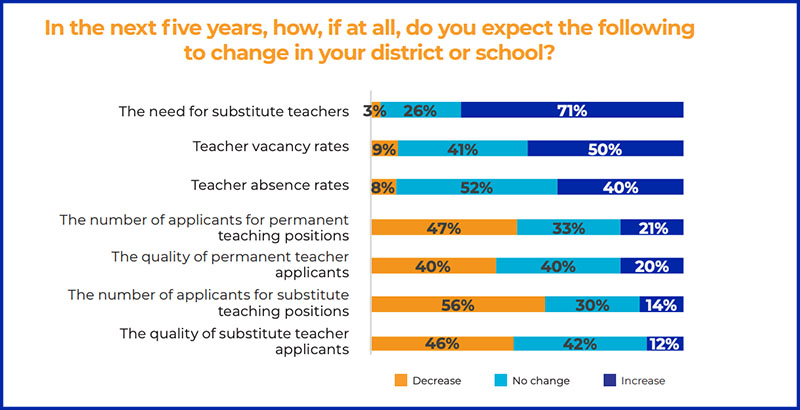Soares: Substitute Teachers Are Unsung Heroes in Reopening Schools. They Deserve Better Pay and Professional Development

As President Donald Trump continues to demand that schools reopen and families across the country anxiously await decisions, districts are asking a critical question: Will teachers come back once the doors reopen?
Early indications suggest that while many will, others fearful of COVID-19 won’t. Those absences will exacerbate a supply gap of some 110,000 teachers that had been growing long before the pandemic, fueled in part by demographic shifts, declining enrollment in teacher preparation programs and a rising number of teacher vacancies.
Twelve percent of teachers say the pandemic may lead them to leave the profession, even though they were not planning to do so before the crisis. This reality begs for new solutions to the long-standing teacher vacancy challenge. Part of the answer lies in our substitute teaching workforce, which according to the Bureau of Labor Statistics totals 600,000.
Substitutes already are among our nation’s unsung heroes. They swoop in at a near moment’s notice when schools need them most, often for too little pay and without the professional development and other benefits that come with being a full-time teacher.
Even in pre-pandemic times, the substitute teaching force was too lean to meet the need. On an average school day, more than 250,000 classrooms require substitutes’ crucial services, but nearly half of these last-minute positions remain unfilled. That can lead to classroom management challenges, increased class sizes and other negative outcomes, impacting learning for all students.
But in pandemic-era schooling — when the need for talent will peak in light of smaller class sizes and teachers in high-risk categories feel hesitant to return to classrooms — substitutes will become an even more integral part of the education workforce. We must seize this opportunity to elevate substitute teachers so they can continue to support our nation’s schools.
In a recently released EdWeek research report commissioned by Kelly Education, an online survey of more than 2,000 principals, district leaders and school board members underscored the need for substitute teachers. They also recognized the growing unmet demand for full-time and substitute talent.
Fifty-six percent of respondents said their teacher absence rates are higher today than they were five years ago. Seventy-one percent of administrators and school board members predicted that the demand for substitute teachers will increase in the next five years.
The economic downturn may temporarily address the need for substitute teachers as Americans return to work, but over the long term, systemic changes are needed to make substitute teaching a more appealing pathway with more professional development, focused recruitment efforts and alternative pathways to full-time teaching credentials for those who desire them.
Survey respondents in the EdWeek report identified pay as the top way to grow the talent pool of substitutes. Districts from Kansas City to Coffee County, Georgia, have increased pay in light of looming substitute shortages. But this will be a difficult solution to scale, given district budget constraints with the economic downturn.
Another promising path is providing professional development to improve substitutes’ instruction and classroom-management skills. This helps elevate substitute teachers, yet 44 percent of administrators and school board members surveyed for the EdWeek report said they do not provide these professional development opportunities.
Nearly half of those surveyed also said their districts do not make any effort to recruit or retain substitute talent. Simply put, we need to treat substitutes as the important individuals they are, especially at a time of unprecedented demand for them, so can help meet a critical need during an unprecedented time. Now more than ever, substitute teachers play an essential role in the success of every student.
It takes a village to educate students, especially during a time of crisis. Investing in the growth and retention of substitute teachers can help us fuel a strong comeback and deliver the safe and equitable education our students deserve.
Nicola Soares is president of the education practice for Kelly, a global provider of talent solutions.
Get stories like these delivered straight to your inbox. Sign up for The 74 Newsletter

;)